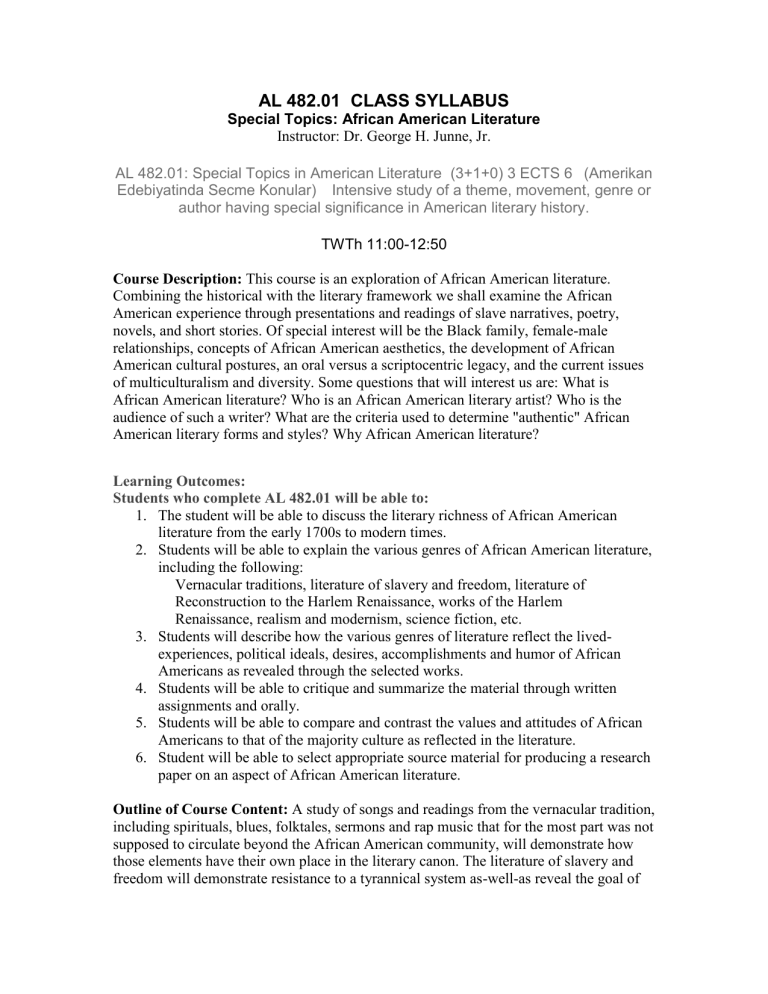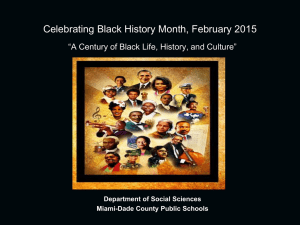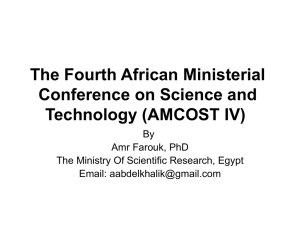BLS 305 Syllabus

AL 482.01 CLASS SYLLABUS
Special Topics: African American Literature
Instructor: Dr. George H. Junne, Jr.
AL 482.01: Special Topics in American Literature (3+1+0) 3 ECTS 6 (Amerikan
Edebiyatinda Secme Konular) Intensive study of a theme, movement, genre or author having special significance in American literary history.
TWTh 11:00-12:50
Course Description: This course is an exploration of African American literature.
Combining the historical with the literary framework we shall examine the African
American experience through presentations and readings of slave narratives, poetry, novels, and short stories. Of special interest will be the Black family, female-male relationships, concepts of African American aesthetics, the development of African
American cultural postures, an oral versus a scriptocentric legacy, and the current issues of multiculturalism and diversity. Some questions that will interest us are: What is
African American literature? Who is an African American literary artist? Who is the audience of such a writer? What are the criteria used to determine "authentic" African
American literary forms and styles? Why African American literature?
Learning Outcomes:
Students who complete AL 482.01 will be able to:
1.
The student will be able to discuss the literary richness of African American literature from the early 1700s to modern times.
2.
Students will be able to explain the various genres of African American literature, including the following:
Vernacular traditions, literature of slavery and freedom, literature of
Reconstruction to the Harlem Renaissance, works of the Harlem
Renaissance, realism and modernism, science fiction, etc.
3.
Students will describe how the various genres of literature reflect the livedexperiences, political ideals, desires, accomplishments and humor of African
Americans as revealed through the selected works.
4.
Students will be able to critique and summarize the material through written assignments and orally.
5.
Students will be able to compare and contrast the values and attitudes of African
Americans to that of the majority culture as reflected in the literature.
6.
Student will be able to select appropriate source material for producing a research paper on an aspect of African American literature.
Outline of Course Content: A study of songs and readings from the vernacular tradition, including spirituals, blues, folktales, sermons and rap music that for the most part was not supposed to circulate beyond the African American community, will demonstrate how those elements have their own place in the literary canon. The literature of slavery and freedom will demonstrate resistance to a tyrannical system as-well-as reveal the goal of
human dignity as outlined in the Declaration of Independence, the Constitution and other
American documents.
The works of Reconstruction to Harlem Renaissance will reflect the “Decades of
Disappointments” plus the social and economic gains of African Americans in the post-
Civil War era. Literature of the Harlem Renaissance will reflect the national cultural flowering in the arts and an unprecedented flood of poetry, fiction, essay and drama that demonstrated a fresh breath of confidence and purpose.
Works of realism, naturalism and modernism that flowered from the 1940s to the 1960s spoke to migration, desegregation and social change, focusing on traditional genres,
“high culture,” and popular fiction.
The Black Arts Movement of the 1960s and 1970s exploded during those decades, expressing the social upheaval in America such as the modern Civil Rights Movement, the Vietnam War, Black Power, the rise of Malcolm X and African countries attempting to pull away from colonialism.
Literature since the 1970s, including science fiction, touched on Womanism, sexual identity and sexual politics, cultural nationalism, experiences of Black immigrants, and a remapping of African American social and cultural history.
Required Text:
The Norton Anthology of African American Literature , 3 rd ed., eds. Henry Louis Gates,
Jr. and Nellie Y. McKay. Stay calm! We will NOT be reading everything in the textbook!
Course Requirements: There will be two examinations and one research (not opinion) paper plus class group presentations. The first examination will be the midterm and the second will be the final exam. Class participation is as essential part of this course and is expected as a normal part of student responsibility. It is required that all reading assignments be completed before class. Therefore, attendance and participation will affect one’s grade. More than three unexcused absences will lower one’s grade.
The paper will be between ten and twelve pages in length, will contain a bibliography separate from the ten pages, and will focus on an aspect of African American Literature.
No biographies will be accepted . A 500-word formal outline and attached bibliography for the paper is due on June 9. You will not be able to change your topic after that date.
The in-class presentations will be small group assignments, where students will present aspects of Black literature and will compare and contrast their information with the readings from other groups.
Grading:
Midterm
Final
Paper
In Class Presentations
25%
30%
25%
10%
Participation/Attendance 10%
Attendance:
2
Attendance will be taken and grades will be lowered for poor attendance. Excused absences will be taken care of immediately by you, not days or weeks after the fact. One cannot participate unless one attends class.
Classroom Civility:
Turn off all electronic devices before coming to class, including computers and cell phones. If you cannot cut your umbilical cord to the outside world for a class period, you should take another class.
Arrive for class on time and avoid leaving early.
Remain attentive throughout the entire class session.
Listen actively and avoid side conversations.
Demonstrate a respectful attitude toward the instructor and other students.
Leave a clean environment for the next class.
If you are absent, find out what you missed from a classmate.
Other Recommended Readings:
Annie Allen
Autobiography of an Ex-Coloured Man
Gwendolyn Brooks
James Weldon Johnson
Black, White and Jewish: Autobiography of a Shifting Self Rebecca Walker
Black Masculinity and the Frontier Myth in American Literature
Michael K. Johnson
Black Orpheus: Music in African American Literature Saadi A. Simawe, ed.
Black Women Novelists
Black Thunder
Blues, Ideology, and Afro-American Literature
Blues People
Brown Girl, Brownstones
Barbara Christian
Arna Bontemps
Houston A. Baker, Jr.
Amiri Baraka
Paule Marshall
Cane Jean Toomer
Claiming the Heritage: African-American Novelists and History
Missy Kubitschek
Classic Plays from the Negro Ensemble Company
Clotel: or, The President's Daughter
Harrison and Edwards, eds.
William Welles Brown
Cornerstones: An Anthology of African American Literature
Melvin Donaldson
Devil in a Blue Dress Roger Mosley
Every Good-bye Ain’t Gone
Go Tell It on the Mountain
Itabari Njeri
James Baldwin
Heavy Daughter Blues
Home Girls: A Black Feminist Anthology
I Know Why the Caged Bird Sings
If He Hollers Let Him Go
Incidents in the Life of a Slave Girl
Invisible Man
Wanda Coleman
Barbara Smith
Maya Angelou
Chester Himes
Harriet A. Jacobs
Ralph Ellison
Iola Leroy, or Shadows Uplifted
Kindred
Frances Harper
Octavia Butler
Liberating Voices: Oral Tradition in African American Literature
3
Gayl Jones
Manchild in the Promised Land Claude Brown
Masterpieces of African-American Literature
Middle Passage
My Bondage and My Freedom
Frank N. Magill, ed.
Charles Johnson
Frederick Douglass
Narrative of the Life and Travels of Mrs. Nancy Prince Nancy Gardner Prince
Negro Catholic Writers, 1900-1945 Mary Scally
Negro Voices in American Literature
Negro’s God as Reflected in His Literature
Passed On: African-American Mourning Stories
Passing
Plum Bun: A Novel Without a Moral
Hugh Gloster
Bernard May
Karla Holloway
Nella Larsen
Jessie Redmon Fauset
Poems on Various Subjects Phillis Wheatley
Prentice Hall Anthology of African American Women’s Literature
Valerie Lee
Raisin in the Sun
Richard Wright: A Collection of Critical Essays
Lorraine Hansberry
Arnold Rampersad, ed.
Shadow and Act
Shaking the Tree: A Collection of New Fiction and Memoir
Ralph Ellison
Meri N-A Danquah
Song of Solomon Toni Morrison
Souls of Black Folk W. E. B. DuBois
Sweet Home: Invisible Cities in the Afro-American Novel Charles Scruggs
The Afro-American Novel and Its Tradition Bernard W. Bell
The Best of Simple
The Blacker the Berry
The Bondswoman’s Narrative
The Color Purple
The Journals of Charlotte L. Forten Grimké
Langston Hughes
Wallace Thurman
Hannah Crafts
Alice Walker
Charlotte L. Forten Grimké
The Man Who Cried I Am
The Negro in American Fiction
The Negro in Literature and Art
The Negro Novelist, 1940-1950 .
The New Cavalcade, vols. 1 & 2
The New Negro
John A. Williams
Sterling Brown
Benjamin Brawley
Carl Milton Hughes
Davis, Saunders, and Joyce
Alain Locke, ed.
The Piano Lesson
The Sexual Mountain and Black Women Writers
Their Eyes Were Watching God
This Bridge Called My Back
August Wilson
Calvin C. Hernton
Zora Neale Hurston
Moraga and Anzaldus
Thomas and Beulah
Up From Slavery
Rita Dove
Booker T. Washington
We Are Your Sisters: Black Women of the Nineteenth Century
Dorothy Sterling, ed.
We Be Word Sorcerers: 25 Stories by Black Americans Sonia Sanchez, ed.
What Looks Like Crazy on an Ordinary Day
Women of Brewster Place
Pearl Cleage
Gloria Naylor
4
Your Blues Ain’t Like Mine Bebe Moore Campbell
5








